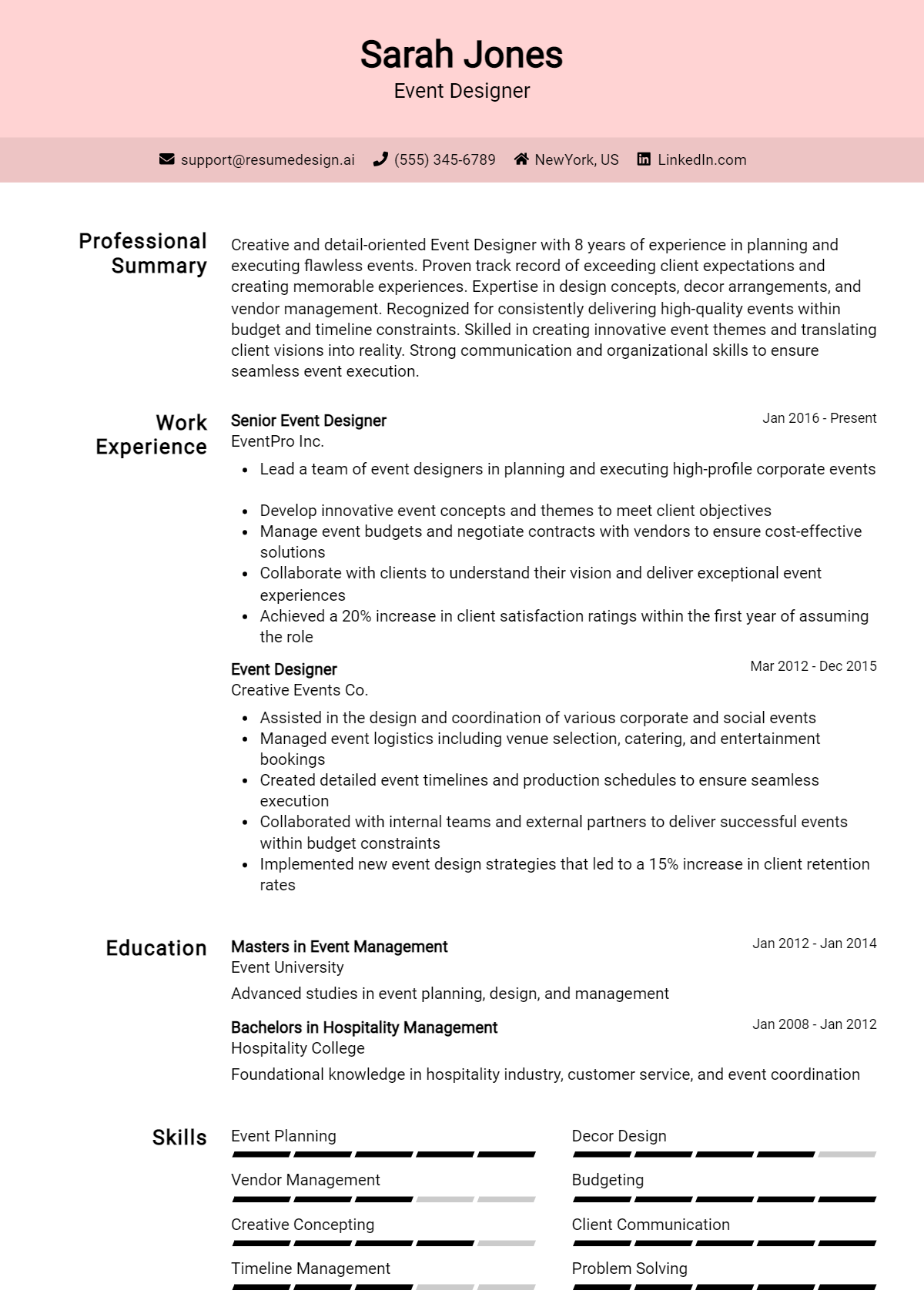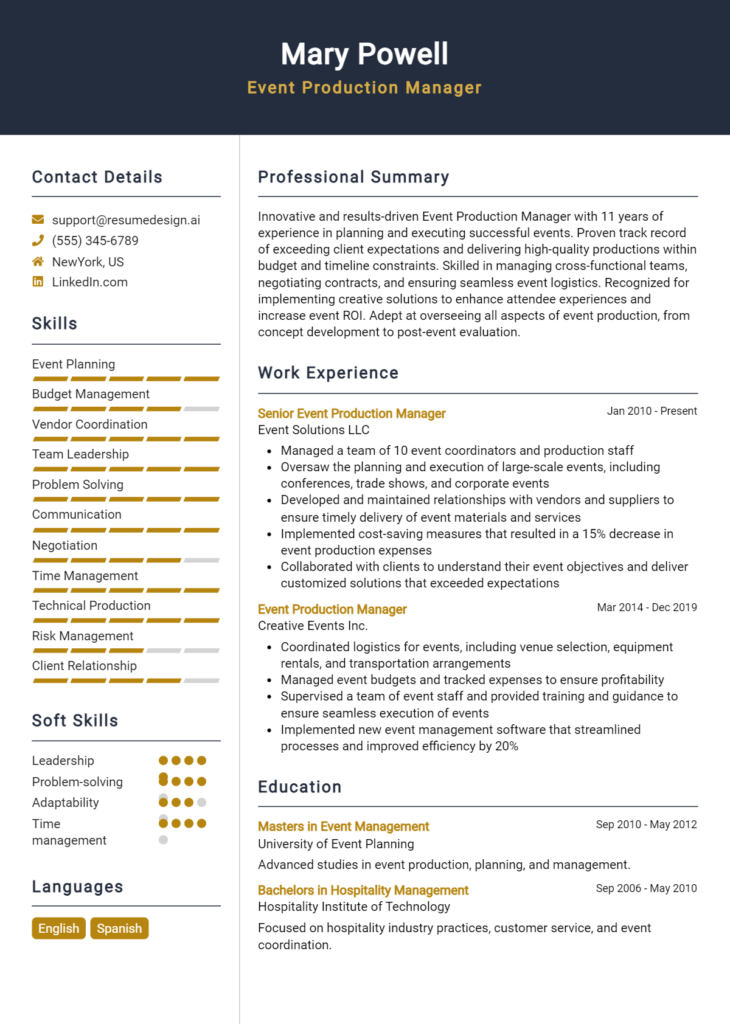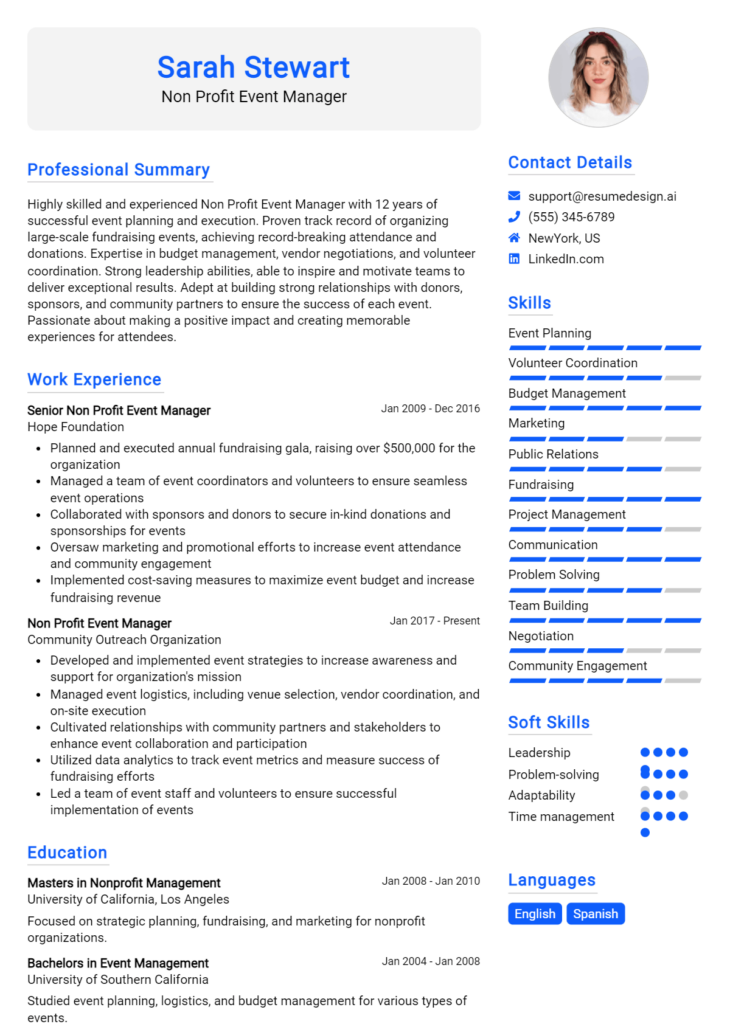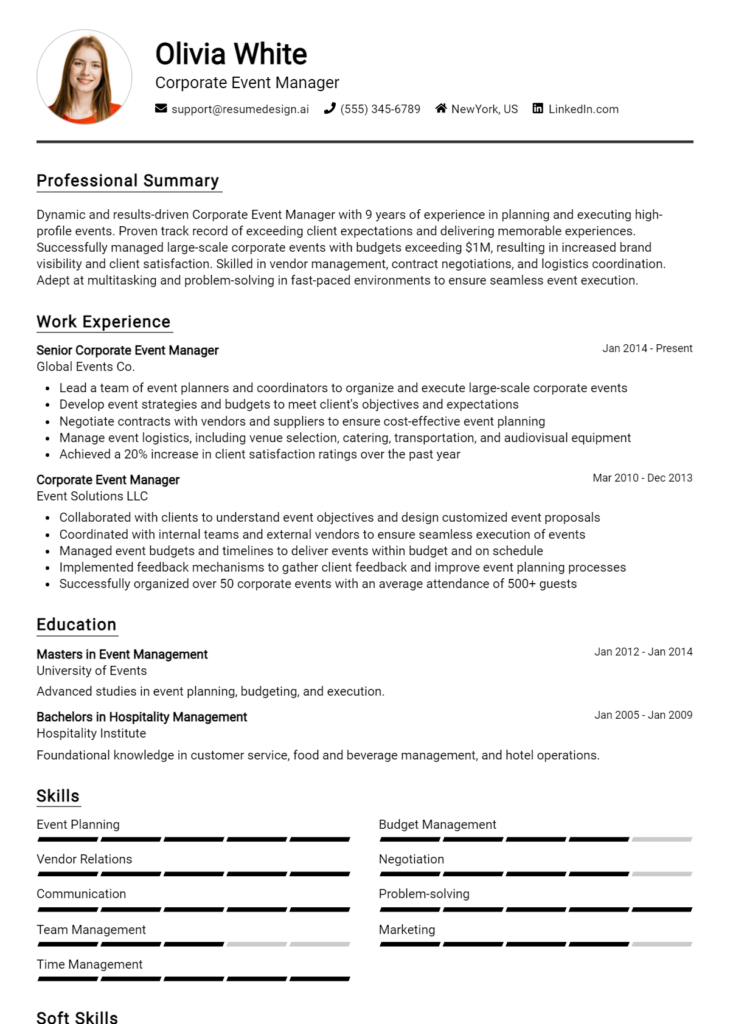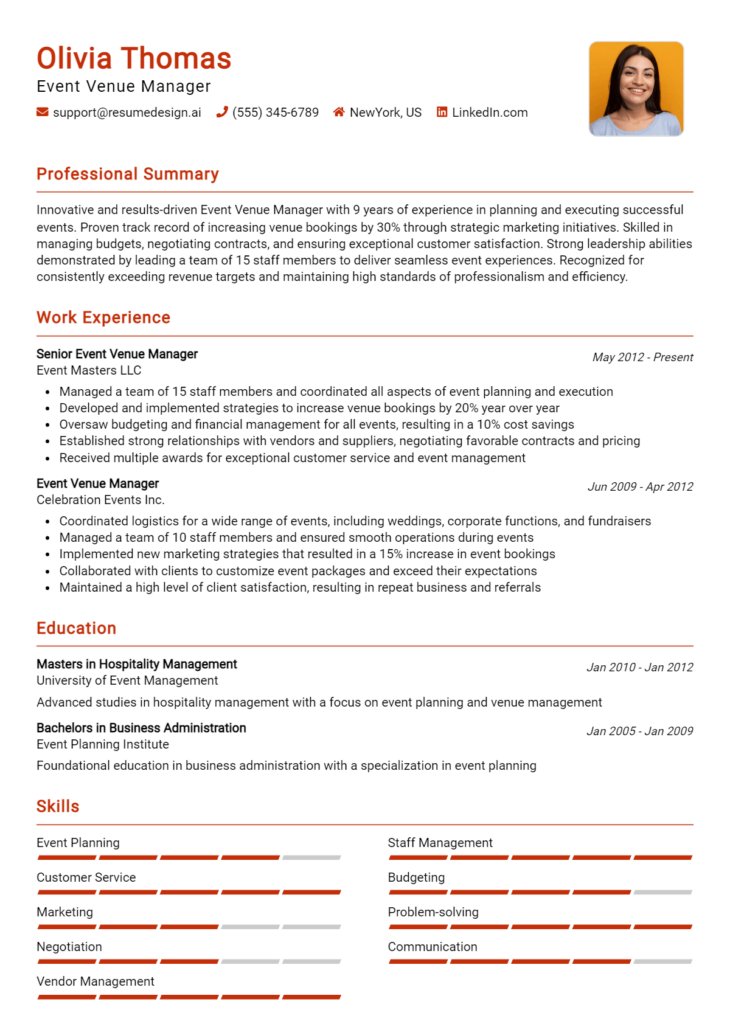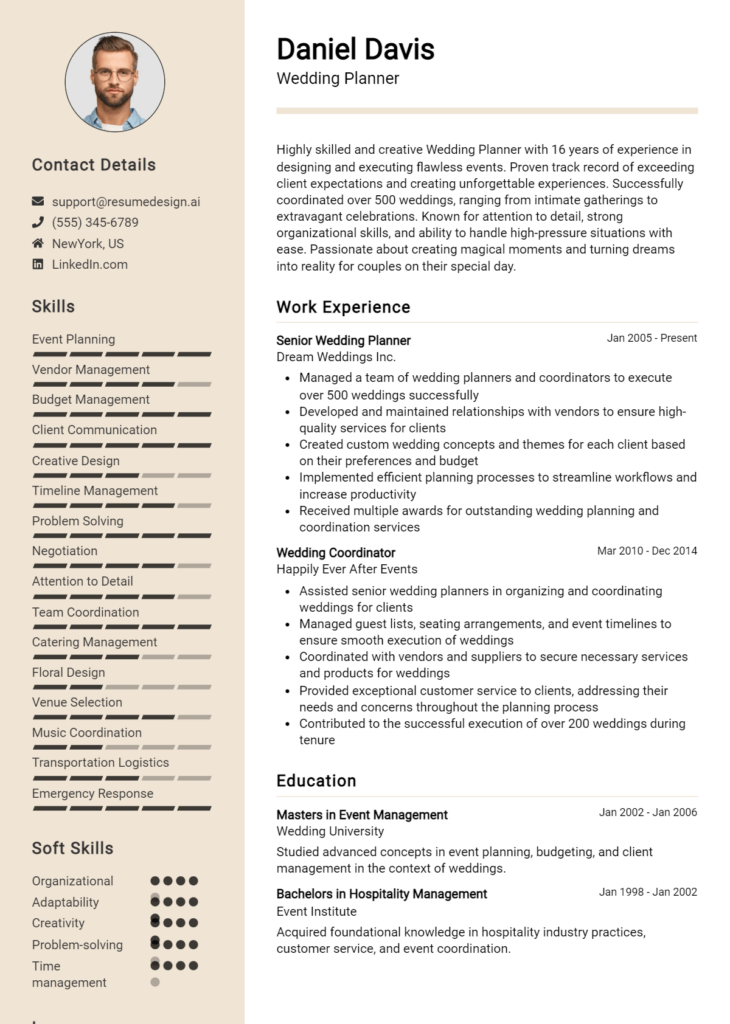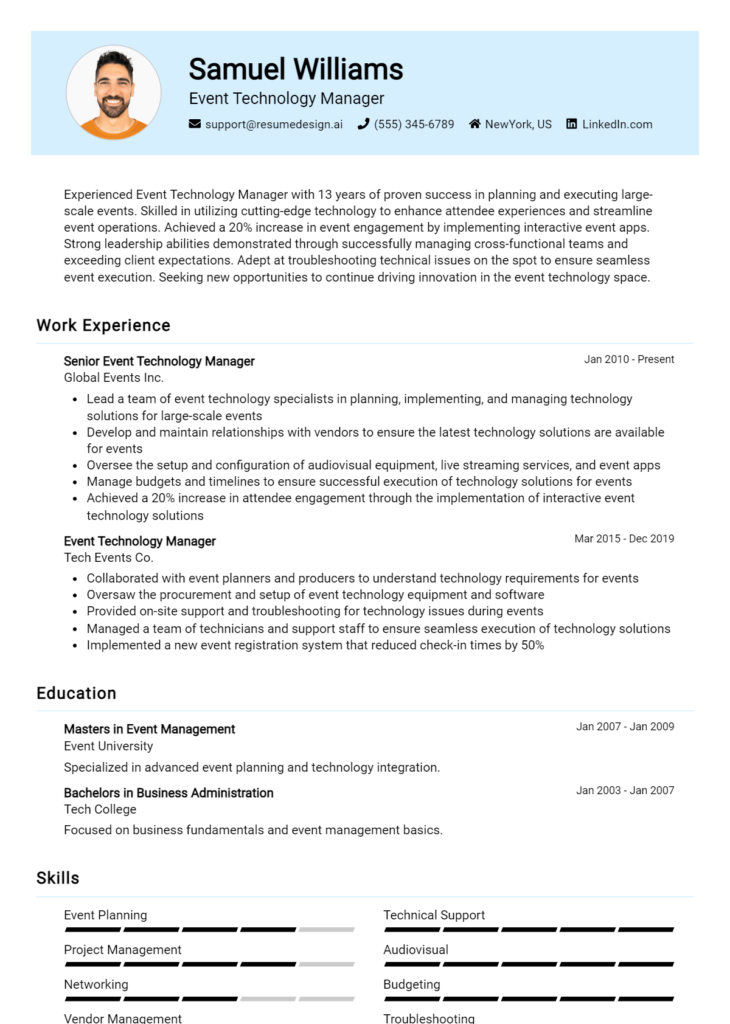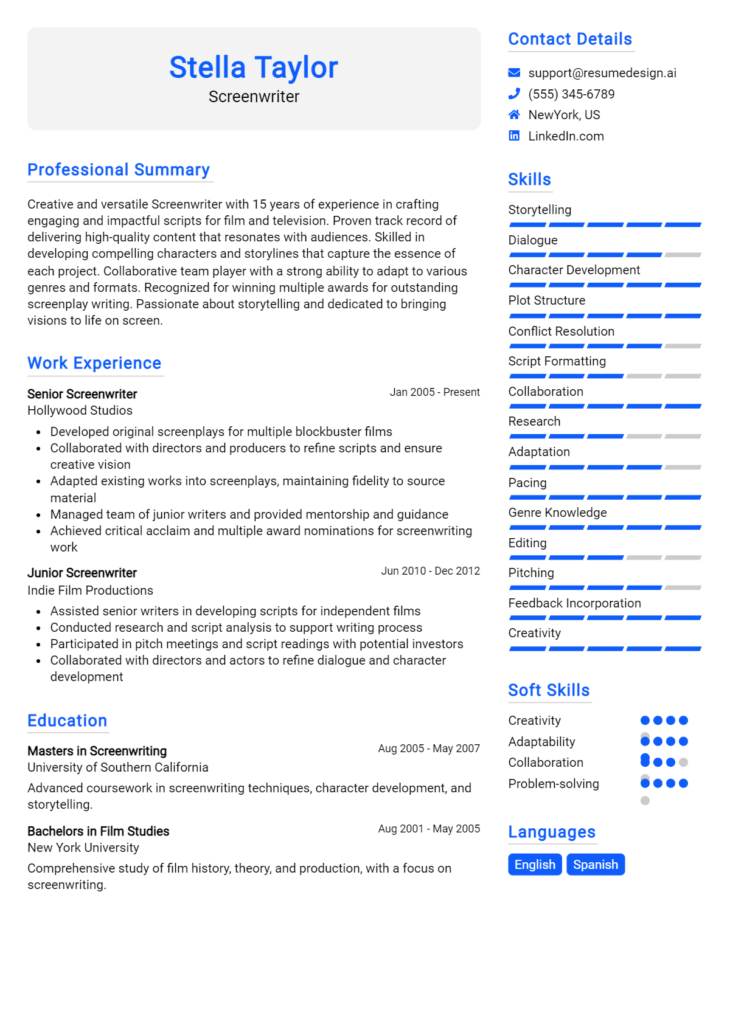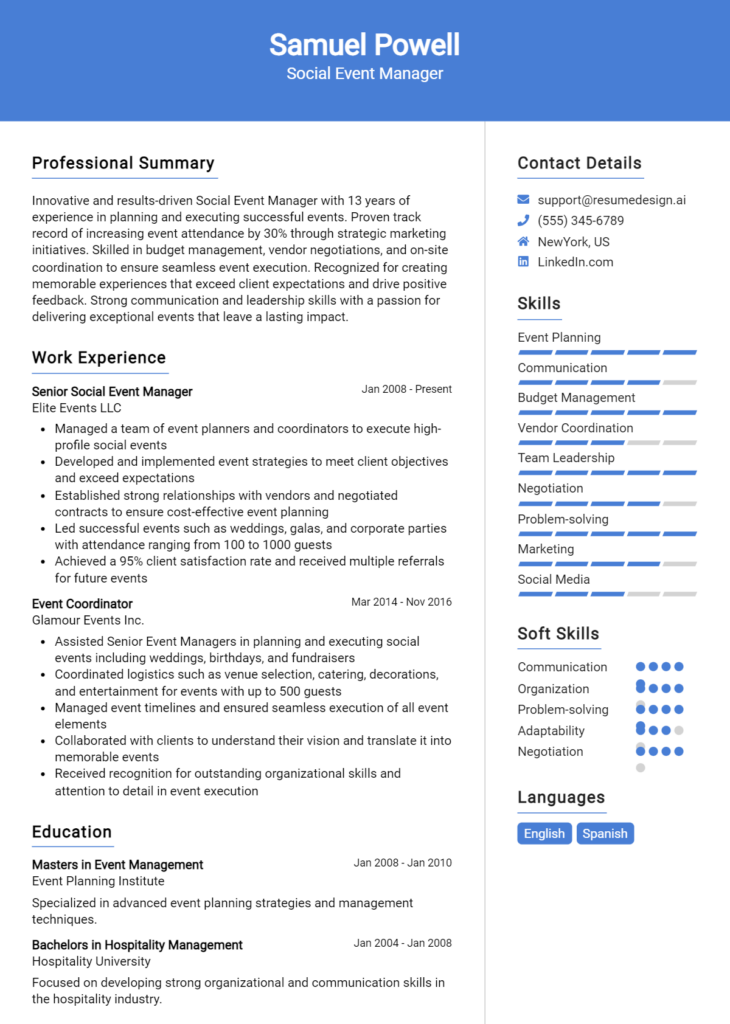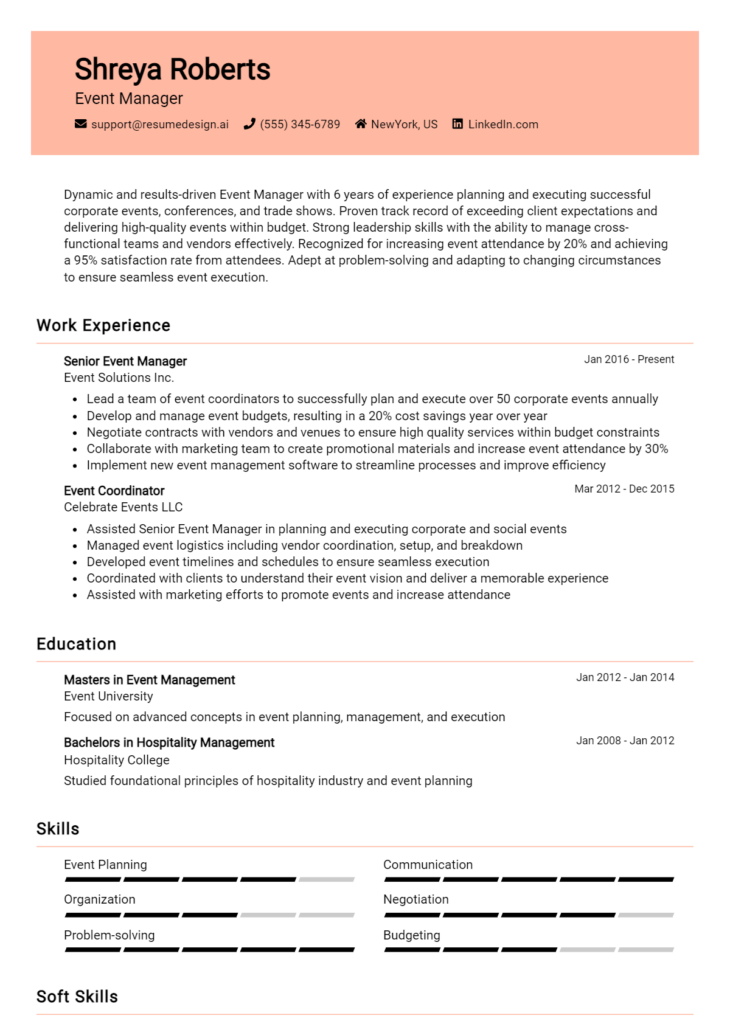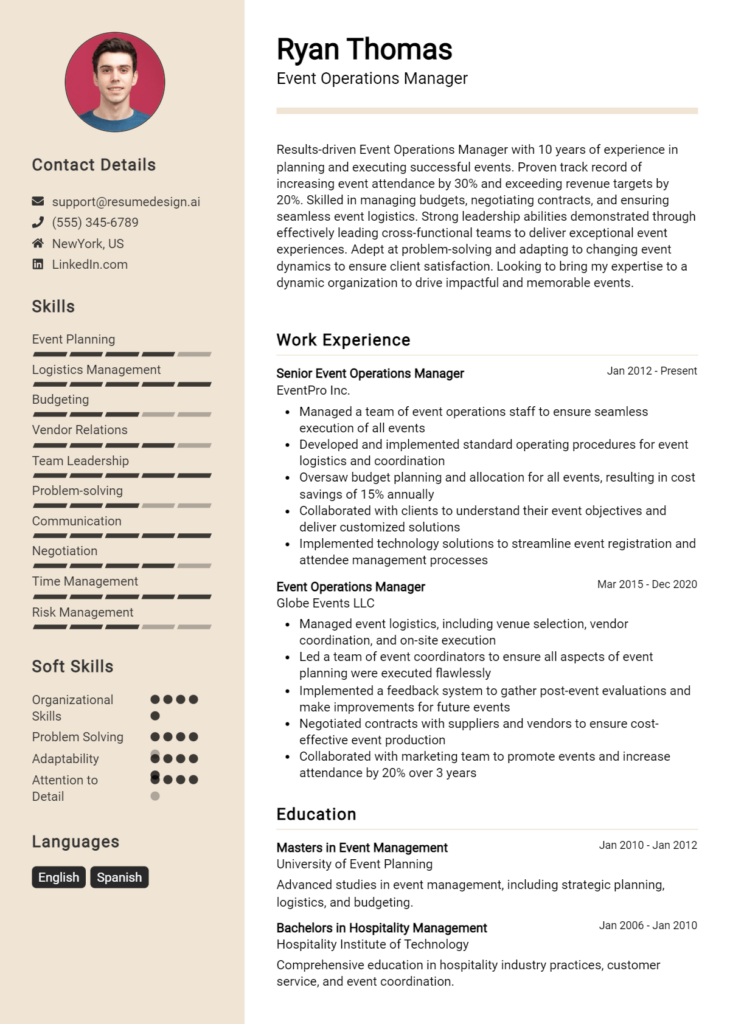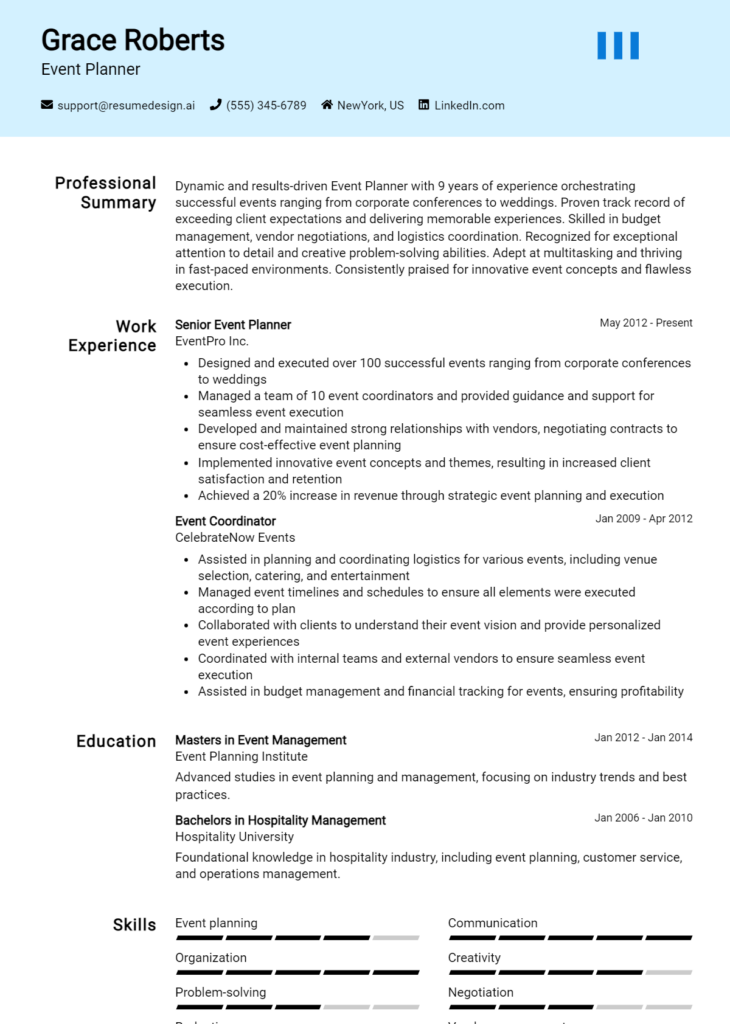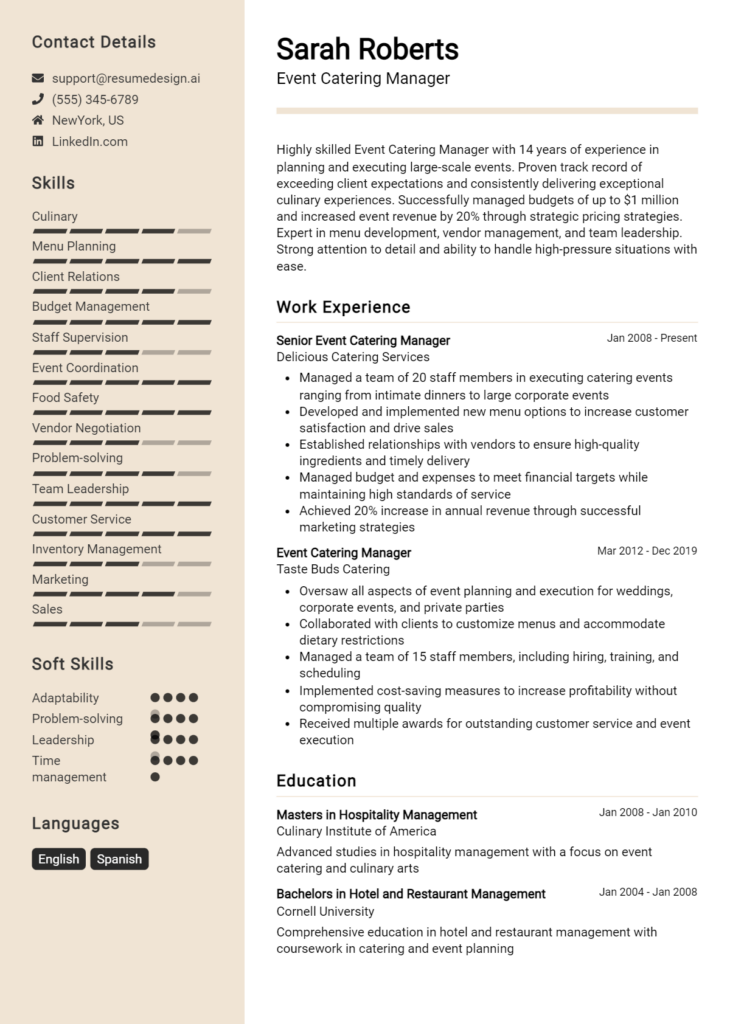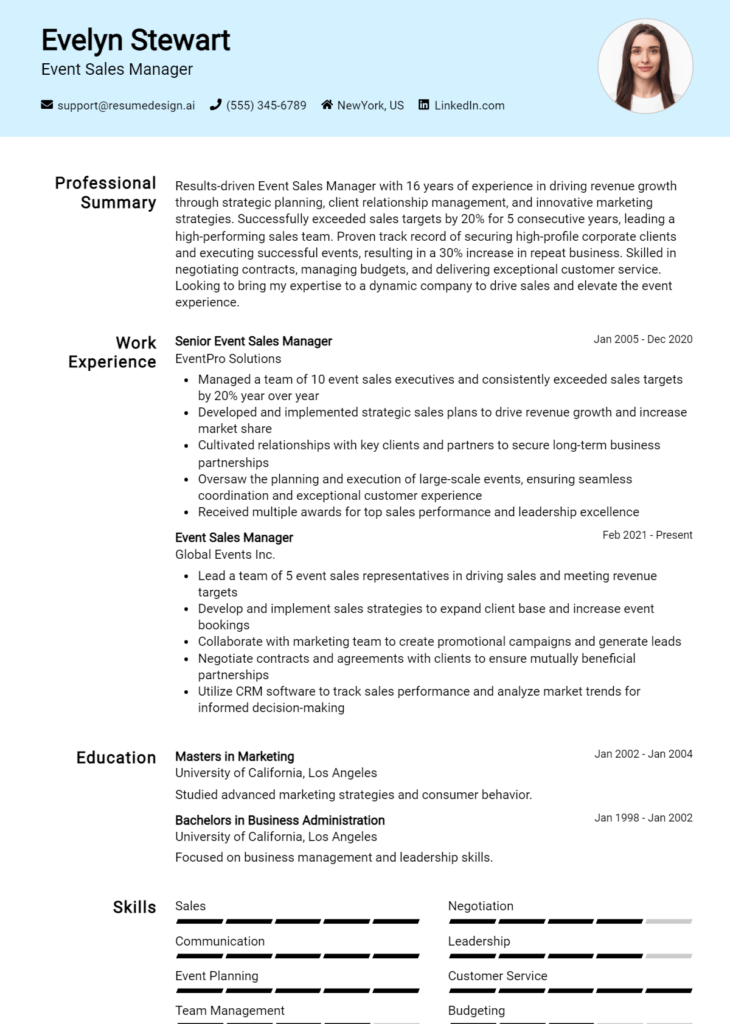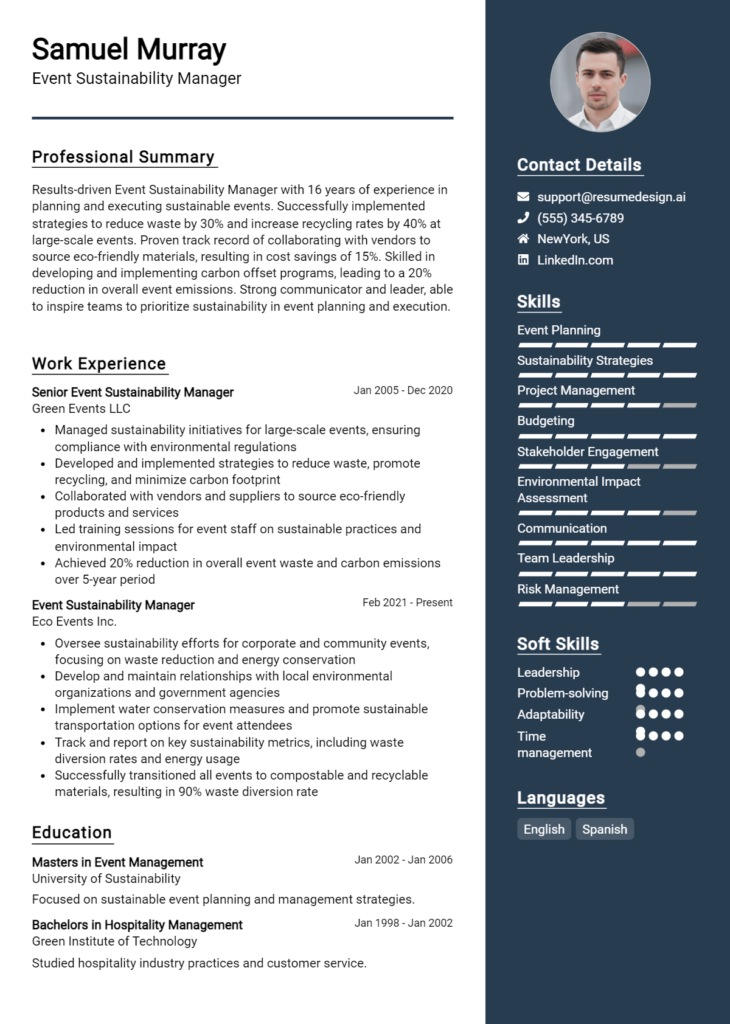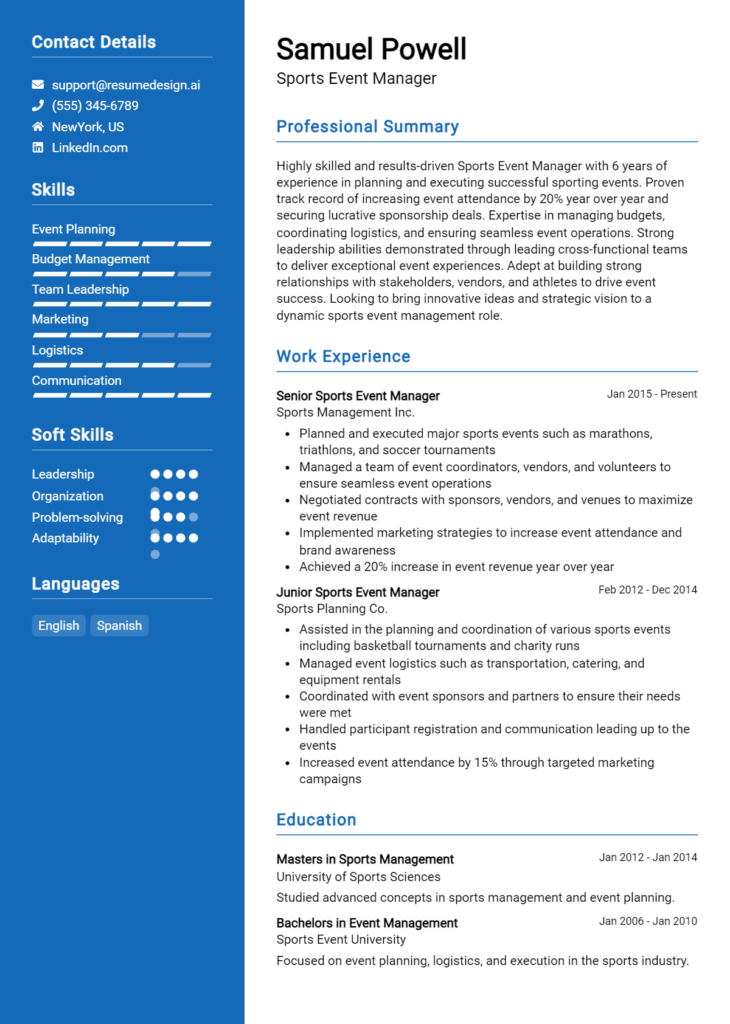Event Designer Core Responsibilities
An Event Designer plays a crucial role in orchestrating successful events by collaborating with various departments, including marketing, logistics, and client management. Key responsibilities include conceptualizing event themes, selecting venues, and managing budgets. A successful Event Designer must possess strong technical skills in design software, operational expertise for seamless execution, and exceptional problem-solving abilities to address challenges on the fly. These skills not only contribute to the organization’s overall goals but also enhance client satisfaction. A well-structured resume effectively highlights these qualifications, showcasing the candidate's ability to drive impactful events.
Common Responsibilities Listed on Event Designer Resume
- Develop and present creative event concepts and proposals.
- Coordinate with vendors, suppliers, and venues to ensure smooth operations.
- Manage event budgets and track expenses to stay within financial limits.
- Create floor plans, seating arrangements, and decor designs.
- Oversee event logistics, including scheduling and staffing requirements.
- Conduct site visits and assess venue suitability for events.
- Collaborate with marketing teams to promote events effectively.
- Ensure compliance with safety and legal regulations for events.
- Gather and analyze feedback post-event for future improvements.
- Provide on-site management during events to address any issues.
- Maintain strong relationships with clients to understand their needs.
- Stay updated on industry trends and innovations in event design.
High-Level Resume Tips for Event Designer Professionals
In the competitive world of event design, your resume serves as your calling card, often being the first impression you make on potential employers. A well-crafted resume is crucial, as it not only showcases your skills and achievements but also reflects your creativity and attention to detail—qualities that are essential in this field. As an Event Designer, your resume needs to effectively communicate your unique aesthetic vision and practical experience in planning and executing successful events. This guide will provide practical and actionable tips specifically tailored for Event Designer professionals, ensuring that your resume stands out in a crowded job market.
Top Resume Tips for Event Designer Professionals
- Tailor your resume to each job description, highlighting relevant skills and experiences that align with the specific requirements of the position.
- Showcase your relevant experience by detailing past projects or roles, emphasizing your responsibility and contributions to successful events.
- Quantify your achievements where possible, such as the number of events planned, budgets managed, or client satisfaction ratings received.
- Highlight industry-specific skills, including proficiency in event planning software, design tools, and knowledge of current trends in event design.
- Incorporate keywords from the job description to pass through Applicant Tracking Systems (ATS) that many companies use.
- Include a portfolio link that showcases your previous work and demonstrates your design aesthetic and project execution capabilities.
- Utilize a clean and professional format that reflects your design style while ensuring readability and organization.
- Emphasize soft skills like communication, teamwork, and problem-solving that are vital in coordinating with clients, vendors, and teams.
- Consider adding a summary or objective statement at the top of your resume that encapsulates your career goals and design philosophy.
By implementing these tips, you can significantly enhance your resume's effectiveness and increase your chances of landing a job as an Event Designer. A polished and tailored resume not only highlights your qualifications but also conveys your passion and commitment to creating memorable events, making you a more attractive candidate to potential employers.
Why Resume Headlines & Titles are Important for Event Designer
In the competitive field of event design, a well-crafted resume is essential for standing out among a sea of candidates. One of the most critical components of a resume is the headline or title, which serves as the first impression for hiring managers. A strong headline can immediately grab attention and summarize a candidate's key qualifications in just a few impactful words. It should be concise, relevant, and tailored to the specific job being applied for, ensuring that it resonates with the employer's needs and expectations.
Best Practices for Crafting Resume Headlines for Event Designer
- Keep it concise: Aim for a headline that is short, ideally one sentence or phrase.
- Be role-specific: Clearly indicate your area of expertise within event design.
- Highlight key skills: Incorporate important skills that are relevant to the job description.
- Showcase accomplishments: If possible, reference specific achievements that set you apart.
- Use powerful language: Opt for strong action words or adjectives that convey confidence.
- Tailor for each application: Customize your headline to align with the specific role and company.
- Consider industry terminology: Use language that is familiar and appealing to hiring managers in the event design space.
- Make it memorable: Aim for a headline that leaves a lasting impression on the reader.
Example Resume Headlines for Event Designer
Strong Resume Headlines
Creative Event Designer Specializing in Unique Thematic Experiences
Award-Winning Event Planner with 5+ Years of Experience in Corporate Events
Expert in Sustainable Event Design and Execution for Non-Profit Organizations
Weak Resume Headlines
Event Designer
Experienced Professional
Strong headlines are effective because they provide a clear and immediate understanding of what the candidate brings to the table, showcasing unique skills and experiences that align closely with the job requirements. In contrast, weak headlines lack specificity and fail to communicate the candidate's value, making them forgettable and ineffective in capturing the interest of hiring managers.
Writing an Exceptional Event Designer Resume Summary
A resume summary is a crucial element for an Event Designer, as it serves as the first impression a hiring manager will have of your skills and experience. A well-crafted summary can quickly capture attention by highlighting key skills, relevant experience, and noteworthy accomplishments that align with the job requirements. It should be concise yet impactful, effectively communicating your value proposition while being tailored to the specific role you are applying for. This tailored approach not only makes your resume stand out but also shows hiring managers that you have taken the time to understand the job and how you can contribute to their team.
Best Practices for Writing an Event Designer Resume Summary
- Quantify achievements: Use numbers and metrics to demonstrate the impact of your work.
- Focus on relevant skills: Highlight skills that are directly applicable to the job description.
- Be concise: Keep your summary brief, ideally within 3-5 sentences.
- Tailor your summary: Customize your summary for each position you apply to, reflecting the specific requirements.
- Use active language: Start sentences with strong action verbs to convey confidence and proactivity.
- Showcase your creativity: Mention innovative design concepts or unique event experiences you’ve created.
- Include industry keywords: Incorporate terminology from the job listing to pass through applicant tracking systems.
- Reflect your personality: Infuse your summary with a sense of your personal style and passion for event design.
Example Event Designer Resume Summaries
Strong Resume Summaries
Dynamic Event Designer with over 5 years of experience in creating unforgettable corporate events, resulting in a 30% increase in client satisfaction ratings. Adept at managing budgets exceeding $100,000 while ensuring seamless execution and innovative design solutions.
Creative Event Designer skilled in transforming client visions into reality, having successfully coordinated over 150 events with a focus on sustainability, leading to a 20% reduction in waste. Proven ability to work under pressure and deliver high-quality results.
Detail-oriented Event Designer with a track record of executing high-impact events for Fortune 500 companies. Recognized for increasing event attendance by 40% through engaging marketing strategies and interactive event features.
Weak Resume Summaries
Experienced Event Designer looking for new opportunities in the industry. I have worked on various events and have a general understanding of event planning.
Creative professional with a passion for design and events. I enjoy working on projects and collaborating with teams, and I hope to find a job in event planning.
The examples provided illustrate the difference between strong and weak resume summaries. Strong summaries effectively quantify achievements, highlight specific skills, and directly relate to the role, showcasing the candidate's value. In contrast, weak summaries are vague, lacking in measurable outcomes and specific details, making it difficult for hiring managers to gauge the candidate's qualifications or enthusiasm for the position.
Work Experience Section for Event Designer Resume
The work experience section of an Event Designer resume is pivotal in demonstrating a candidate's expertise and impact within the industry. This section not only highlights the technical skills necessary for designing and executing successful events but also showcases the ability to manage teams effectively and deliver high-quality products. By quantifying achievements and aligning experiences with industry standards, candidates can provide compelling evidence of their contributions, enhancing their appeal to potential employers.
Best Practices for Event Designer Work Experience
- Utilize action verbs to convey a sense of initiative and impact.
- Quantify achievements using metrics such as budget management, attendance numbers, or client satisfaction rates.
- Highlight technical skills relevant to event design, such as proficiency in design software or project management tools.
- Demonstrate collaboration by mentioning cross-functional teams or partnerships with vendors and clients.
- Include specific details about the types of events organized, showcasing versatility and adaptability.
- Tailor the work experience to reflect industry standards and expectations, ensuring relevance to the job applied for.
- Focus on results-driven statements that showcase the positive outcomes of your work.
- Maintain clarity and conciseness to ensure easy readability and understanding for hiring managers.
Example Work Experiences for Event Designer
Strong Experiences
- Successfully planned and executed a corporate gala with over 500 attendees, achieving a 95% satisfaction rate as indicated by post-event surveys.
- Led a creative team in designing an award-winning wedding event that increased client referrals by 30% within one year.
- Managed a $200,000 budget for a multi-day conference, coming in 15% under budget while increasing attendance by 25% from the previous year.
- Collaborated with a team of 10 vendors to deliver a seamless festival experience, resulting in a 40% increase in ticket sales compared to the previous year.
Weak Experiences
- Helped with various events and tasks as needed.
- Assisted in planning a few events without specific details.
- Worked with a team on event setups occasionally.
- Participated in events that were generally well-received.
The strong experiences listed above are considered effective because they provide specific, quantifiable outcomes that demonstrate the candidate's impact and technical leadership in event design. Each bullet point focuses on measurable achievements and showcases collaboration, making them compelling to potential employers. In contrast, the weak experiences lack detail and quantifiable results, making it difficult for hiring managers to assess the candidate's capabilities and contributions, ultimately leading to a less impactful impression.
Education and Certifications Section for Event Designer Resume
The education and certifications section of an Event Designer's resume is crucial as it showcases the candidate's academic background, specialized training, and commitment to continuous learning in a dynamic industry. It highlights the knowledge and skills acquired through relevant coursework and certifications, reinforcing the candidate's qualifications for the role. By providing this information, candidates can significantly enhance their credibility and demonstrate their alignment with the specific demands of event design, making a compelling case to potential employers.
Best Practices for Event Designer Education and Certifications
- Prioritize relevant degrees, such as those in Event Management, Hospitality, or Design.
- Include industry-recognized certifications, such as Certified Meeting Professional (CMP) or Certified Special Events Professional (CSEP).
- Detail specialized training programs or workshops that enhance your event design skills.
- Highlight any relevant coursework that pertains to design principles, project management, or marketing.
- Use clear and concise language that emphasizes the importance of each qualification.
- Keep the section organized and easy to read, ensuring that the most relevant information is prominent.
- Update this section regularly to reflect new credentials and educational experiences.
- Consider including a brief description of major projects or experiences linked to your education or certifications.
Example Education and Certifications for Event Designer
Strong Examples
- Bachelor of Arts in Event Management, XYZ University, 2020
- Certified Meeting Professional (CMP), Event Industry Council, 2021
- Diploma in Floral Design, ABC Academy, 2019
- Project Management for Events, Online Certification, 2022
Weak Examples
- Bachelor of Arts in History, DEF University, 2018
- Certification in Basic Computer Skills, GHI Institute, 2017
- High School Diploma, 2015
- Outdated certification in General Event Planning, 2010
The examples provided are considered strong because they directly relate to the skills and knowledge required for an Event Designer, showcasing relevant degrees and recognized certifications that enhance credibility. In contrast, the weak examples illustrate qualifications that do not align with the specific demands of the role, such as degrees in unrelated fields or outdated certifications, which may diminish a candidate's appeal to employers looking for specialized expertise in event design.
Top Skills & Keywords for Event Designer Resume
As an Event Designer, your resume serves as a vital tool to showcase your qualifications and capabilities in a competitive job market. Highlighting the right skills can set you apart from other candidates and demonstrate your ability to create memorable and impactful events. A well-crafted resume should reflect both soft and hard skills that are essential in this role. Soft skills demonstrate your interpersonal abilities, creativity, and adaptability, while hard skills showcase your technical expertise and specific knowledge related to event design. Together, they provide a comprehensive picture of your qualifications, making it crucial to carefully select and present these skills on your resume.
Top Hard & Soft Skills for Event Designer
Soft Skills
- Creativity
- Communication
- Problem-solving
- Team collaboration
- Time management
- Attention to detail
- Adaptability
- Client relationship management
- Negotiation
- Leadership
Hard Skills
- Event planning software proficiency
- Budget management
- Vendor coordination
- A/V equipment knowledge
- Graphic design skills
- Knowledge of event regulations and permits
- Marketing and promotional strategies
- Spatial design and layout planning
- Floral arrangement
- Technical support for events
By emphasizing these skills on your resume, you can effectively convey your qualifications to potential employers. Additionally, complementing these skills with relevant work experience will further enhance your appeal as a candidate in the event design industry.
Stand Out with a Winning Event Designer Cover Letter
Dear [Hiring Manager's Name],
I am excited to apply for the Event Designer position at [Company Name], as advertised on [Job Board/Company Website]. With over [X years] of experience in creating unforgettable events that marry aesthetics with functionality, I am confident in my ability to contribute effectively to your team. My background in design, project management, and client relations has equipped me with a unique skill set that allows me to bring visions to life while ensuring an impeccable guest experience.
Throughout my career, I have successfully designed and executed a variety of events, from corporate conferences to elegant weddings. My approach begins with understanding the client's vision and objectives, allowing me to curate personalized designs that resonate with their brand and audience. For instance, while working with [Previous Company/Client], I conceptualized a multi-day conference that not only met the client's goals but also received rave reviews for its innovative décor and seamless logistics. I thrive in fast-paced environments, adeptly managing timelines and budgets while collaborating with vendors and stakeholders to ensure every detail is perfect.
What sets me apart as an Event Designer is my passion for storytelling through design. I believe that every event has a narrative, and I strive to create immersive experiences that leave lasting impressions. Whether it’s through the choice of color palettes, floral arrangements, or interactive elements, I aim to captivate attendees and create memorable moments. I am excited about the opportunity to bring my creative vision and attention to detail to [Company Name] and contribute to your reputation for excellence in event design.
Thank you for considering my application. I look forward to the possibility of discussing how my skills and experiences align with the goals of your team. I am eager to contribute my expertise in crafting unique and engaging events that resonate with your clients.
Sincerely,
[Your Name]
[Your Contact Information]
[Your LinkedIn Profile or Website]
Common Mistakes to Avoid in a Event Designer Resume
When crafting a resume as an Event Designer, it's crucial to present your skills and experiences in a way that captures the attention of hiring managers. However, many candidates make common mistakes that can undermine their chances of landing an interview. Understanding these pitfalls can help you create a more effective resume that highlights your strengths and unique contributions to the field of event design.
Lack of Tailoring: Submitting a generic resume without customizing it for the specific job can make you appear uninterested. Each position may require different skills or experiences, so tailor your resume to match the job description.
Overly Complicated Design: As an Event Designer, showcasing your creativity is important, but overloading your resume with graphics or unusual layouts can make it difficult to read. Aim for a clean, professional look that highlights your design sensibility without being distracting.
Ignoring Keywords: Many companies use applicant tracking systems (ATS) to filter resumes. Failing to include relevant keywords from the job posting can result in your resume being overlooked. Carefully analyze the job description and incorporate those terms throughout your resume.
Vague Descriptions: Providing vague or generic descriptions of your experiences can leave hiring managers confused. Instead, use specific examples of your work, detailing your role and the impact you made on each project.
Neglecting Metrics: Not quantifying your achievements can weaken your resume. Use numbers to demonstrate your successes, such as the number of events you’ve designed, the size of the audiences, or budget management.
Focusing Solely on Tasks: Listing job duties instead of showcasing accomplishments can make your resume feel flat. Highlight what you achieved in each role and how you went above and beyond typical responsibilities.
Omitting Relevant Skills: Failing to include essential skills, such as project management, vendor negotiation, or design software proficiency, can leave hiring managers questioning your capabilities. Be sure to list skills that are relevant to the event design field.
Typos and Grammatical Errors: Spelling mistakes or grammatical errors can create a negative impression, making it seem like you lack attention to detail. Always proofread your resume multiple times and consider having someone else review it before submission.
Conclusion
As an Event Designer, your role is pivotal in crafting memorable experiences that resonate with clients and attendees alike. Throughout this article, we explored the essential skills and qualifications necessary for success in this dynamic field. From understanding client needs and creating cohesive themes to managing logistics and ensuring flawless execution, every detail matters. We also discussed the importance of creativity, organization, and communication in bringing a vision to life and the impact these elements have on an event's overall success.
In conclusion, it's crucial to present your qualifications and experiences effectively to stand out in the competitive job market. Take the time to review your Event Designer resume and ensure that it highlights your unique skills and accomplishments. To assist you in this process, consider utilizing resources like resume templates, which can provide a professional layout that showcases your expertise. You can also use the resume builder to create a polished resume tailored to your strengths.
Additionally, exploring resume examples can inspire you to enhance your own resume and make it more appealing to potential employers. Don’t forget the importance of a compelling introduction or cover letter; check out the cover letter templates available to help you craft an engaging narrative that complements your resume.
Take action now—revamp your resume and position yourself for success in the thriving world of event design!

